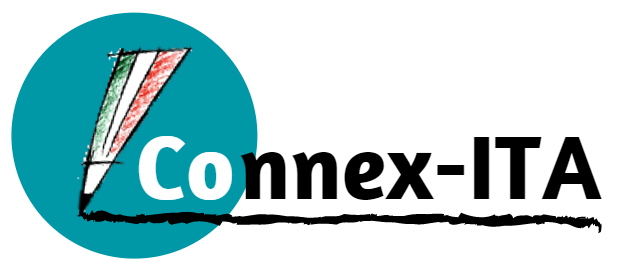COMMON QUESTIONS FOR INTRODUCTIONS (IN ITALIAN)
When you meet new people you normally ask some general questions to know more about them.
In this Italian lesson, I’ll show you the most common questions asked in introductions. You’ll learn how to say in Italian: “what’s your name?“, “where are you from?“, “where do you live?“, “what’s your job?” and also “how old are you?“.
Keep reading to be ready when you meet your next Italian friend!
5 COMMON ITALIAN QUESTIONS IN INTRODUCTIONS
Imagine you’ve just met someone and you want to start a conversation. The first thing you do is asking for some general information such as their name, their origins, where they live, their job, or their age. Let’s see how to ask these questions in Italian.
1. “WHAT’S YOUR NAME?” in Italian
“What’s your name?” is generally the first question everyone asks. This is how you say it in Italian:
- Tu come ti chiami? (Informal)
- Lei come si chiama? (Formal)
“Chiamare” is a regular verb and in this context means “to be named“.
"Tu come ti chiami?" / "Lei come si chiama?"
Remember in Italian there’s a difference between a formal and a casual speech. You can review the lesson on this topic here.
“My Name is …” (in Italian)
You can reply to the above question in two ways:
- (Io) mi chiamo + [Your Name]
- (Io) sono + [Your Name]
In the first option, you use the verb “chiamare” while in the second one the verb “essere” (to be). There’s no difference in their meaning so pick up the one you prefer!
Let’s move on to the second question now that is for knowing their origins.
2. “WHERE ARE YOU FROM?” in Italian
It’s very typical to ask someone: “Where are you from?” especially if they’re from another country.
This is how you ask for someone’s origins in Italian:
- (Tu) di dove sei? (Informal)
- (Lei) di dove è? (Formal)
(Tu) di dove sei? / (Lei) di dove è?
Check out this lesson to learn a different way to ask “where are you from?” in Italian and also the names of the countries and nationalities.
“I’m From …” (in Italian)
You can reply to the previous question in two ways: telling your nationality or the name of your city (if it’s well known).
This is how you structure your sentence:
- (Io) sono + [Your Nationality]
- Io) sono di + [Your city]
Let’s see a couple of examples:
- Io sono Inglese (I’m British)
- Io sono di Londra (I’m from London)
- Io sono Americano (I’m American)
- Io sono di Boston (I’m from Boston)
3. “WHERE DO YOU LIVE?” in Italian
After the name and the origins, another popular questions is the following: “where do you live?”.
Here you need the verb “vivere” (to live) which is regular so it’s conjugation is pretty easy to learn. For now you only need the present tense in the singular that’s the below:
- Io vivo
- Tu vivi
- Lui/Lei vive
To learn the full conjugation, you can check the lesson on the regular verbs in “ere” here.
So in Italian you ask this question in the following way:
- (TU) DOVE VIVI? (informally)
- (LEI) DOVE VIVE? (formally)
and then you reply:
- (IO) VIVO IN + [Country] e.g. Io vivo in Irlanda
- (IO) VIVO A + [City] e.g. Io vivo a Dublino
Basically the only thing that change is the preposition: you need to use “in” before a country and “a” before a city.
4. “WHAT’S YOUR JOB?” in Italian
Let’s move on to our following question which is also pretty common in introduction: “what’s your job?” or “what do you do as a living?“.
In Italian we use the verb FARE that in English means to do. This is an irregular verb so it’s conjugation is not very straight forward … you can see below the singular form.
So this is how you ask the question:
- (TU) CHE LAVORO FAI? (informally)
- (LEI) CHE LAVORO FA? (formally).
Where the word “lavoro” means job and sometimes can be left out without changing the meaning of the sentence.
There are two ways that you can reply to this question:
- (IO) FACCIO + [Article] + [Your job] e.g. io faccio lo studente (I’m a student)
- (IO) SONO + [Your profession] e.g. io sono studente (I’m a student)
These two answers have the exact same meaning but probably the second one is more straight forward. In fact, to reply using the first formula you need to know the Italian articles.
5. “HOW OLD ARE YOU?” in Italian
We’re finally come to our last question for today which is: “how old are you?”.
In Italian you need the verb “to have” to ask this question and I have an entire lesson on how to use this verb. So check it out here.
Let’s go back to our query … this is how to say it in Italian:
- (TU) QUANTI ANNI HAI? (informally)
- (LEI) QUANTI ANNI HA? (formally)
And the way you reply is very simple:
- (IO) HO + [Your age] + ANNI
LET’S RECAP …
In this lesson you’ve seen how to ask and reply to 5 very common Italian questions in introductions. Let’s seen them one more time:
1. What’s your name?
come ti chiami? / come si chiama?
2. Where are you from?
di dove sei? / di dove e’?
3. Where do you live?
dove vivi? / dove vive?
4. What’s your job?
Che lavoro fai? / Che lavoro fa?
5. How old are you?
Quanti anni hai? / Quanti anni ha?


